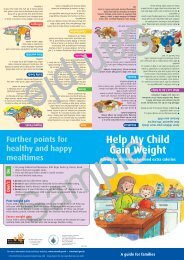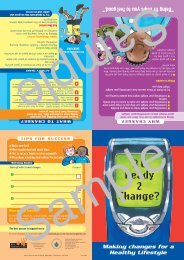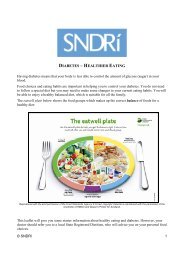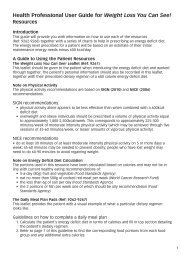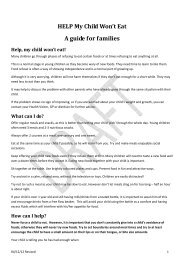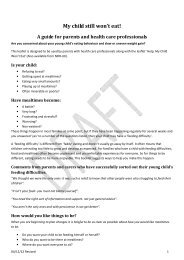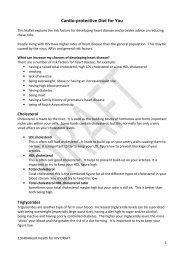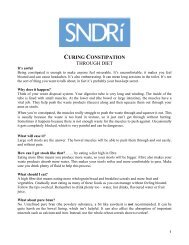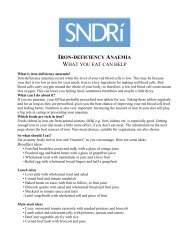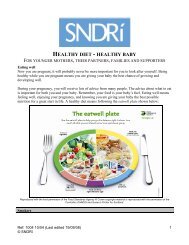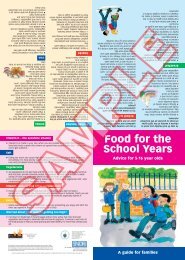Create successful ePaper yourself
Turn your PDF publications into a flip-book with our unique Google optimized e-Paper software.
HELP<br />
My <strong>child</strong> won’t <strong>eat</strong>!<br />
A guide for families
<strong>Help</strong>, <strong>my</strong> <strong>child</strong> won’t <strong>eat</strong>!<br />
Many <strong>child</strong>ren go through phases of refusing<br />
to <strong>eat</strong> certain foods or at times refusing to<br />
<strong>eat</strong> anything at all.<br />
This is a normal stage in young <strong>child</strong>ren as they<br />
become wary of new foods. They need time to<br />
learn to like them. Food refusal is often a way<br />
of showing independence and is a normal part<br />
of growing up.<br />
Although it is very worrying, <strong>child</strong>ren will not<br />
harm themselves if they don’t <strong>eat</strong> enough for a<br />
short while. They may need less to <strong>eat</strong> than you<br />
think.<br />
It may help to discuss the problem with<br />
other parents who have already gone<br />
through the same situation with their<br />
<strong>child</strong>.<br />
If the problem shows no sign of improving, or if<br />
you are worried about your <strong>child</strong>’s weight and<br />
growth, you can contact your Health Visitor, GP,<br />
or Dietitian for further advice.<br />
1
What can I do?<br />
Offer regular meals and snacks, as this is better than letting your<br />
<strong>child</strong> ‘pick’ through the whole day. Young <strong>child</strong>ren often need 3<br />
meals and 2-3 nutritious snacks.<br />
Always offer 2 courses at a meal, one savoury and one sweet.<br />
Eat at the same time as your <strong>child</strong> if possible, as he will learn from<br />
you. Try and make meals enjoyable social occasions.<br />
Keep offering your <strong>child</strong> new foods even if they refuse them at first.<br />
Many <strong>child</strong>ren will need to taste a new food well over a dozen<br />
times before they accept it. Eating new foods together with your<br />
<strong>child</strong> is important.<br />
Sit together at the table. Use brightly coloured plates and cups.<br />
Present food in fun and attractive ways.<br />
Try and <strong>eat</strong> in a calm, relaxed area, without the television or toys.<br />
Children are easily distracted!<br />
Try not to rush a meal as your <strong>child</strong> may be slow to <strong>eat</strong>. However<br />
don’t let meals drag on for too long – half an hour is about right.<br />
2
How can I help?<br />
NEVER FORCE A CHILD TO EAT<br />
Your <strong>child</strong> is telling you he has had<br />
enough when:<br />
he turns his head away<br />
he pushes the bowl or plate away or<br />
onto the floor!<br />
he screams or shouts<br />
he spits food out rep<strong>eat</strong>edly<br />
he holds his food in his mouth and<br />
refuses to swallow it.<br />
Although it is a very difficult thing to do,<br />
try not to show that you are worried or<br />
annoyed by your <strong>child</strong> not <strong>eat</strong>ing. If he<br />
does <strong>eat</strong>, show him you are pleased (for<br />
example, smile and say, ‘good boy, well<br />
done!’). If he stops <strong>eat</strong>ing at a meal, try<br />
once to encourage him to <strong>eat</strong> a little<br />
more. If he doesn’t want anymore,<br />
take the food away without any<br />
comment.<br />
It is a good idea for <strong>child</strong>ren to use<br />
their fingers to play with food.<br />
Do not worry if they make a<br />
mess!<br />
When your <strong>child</strong> <strong>eat</strong>s well offer a<br />
reward such as taking him to the<br />
park or spending some<br />
special time playing together.<br />
Do not offer a reward of food.<br />
3
Which foods do I give when?<br />
� Give small portions of food at meal times. If these are<br />
finished, praise your <strong>child</strong> and offer more. Do not take<br />
food away and offer a completely different<br />
meal if the first one is refused.<br />
� Finger foods are often easier to manage as a<br />
<strong>child</strong> can feed himself. Try sandwiches, sausages,<br />
cheese slices, cream cheese on crackers<br />
potato wedges, fish fingers, vegetable<br />
slices and pieces of fruit.<br />
� New foods need to be offered<br />
several times before <strong>child</strong>ren will even try them. It is a good idea to offer<br />
at least one thing you know your <strong>child</strong> will <strong>eat</strong> at each meal.<br />
� Giving <strong>child</strong>ren fizzy drinks, squash, milk, crisps, biscuits or cakes can<br />
fill them up. This means they may have a smaller appetite for food at<br />
meal times. Avoid giving snacks too close to meal times.<br />
Milk is a nutritious drink but should<br />
not replace meals. Be careful not to<br />
let your <strong>child</strong> drink more than<br />
600ml of milk in total during the<br />
day/night.<br />
4
Sensible <strong>eat</strong>ing for 1-5 year olds<br />
Suggestions to help you:<br />
BREAKFAST<br />
Small bowl of breakfast cereal and milk<br />
or toast with butter/margarine and<br />
jam/honey. Cup of milk to drink.<br />
LIGHT MEAL<br />
Sandwich in bitesize shapes e.g. ham and<br />
tomato, cheese and cucumber, peanut<br />
butter or baked beans or cheese on toast.<br />
Small pot of yogurt/fromage frais/fruit.<br />
Cup of water or diluted fruit juice.<br />
MAIN MEAL<br />
Pasta dishes e.g. macaroni cheese,<br />
spaghetti Bolognese.<br />
Chapatti/rice and curry.<br />
Fish in white, cheese or parsley sauce.<br />
Roast m<strong>eat</strong> or mince e.g. shepherd’s pie.<br />
Fish fingers/chicken Nuggets.<br />
- Serve with vegetables e.g. broccoli,<br />
fingers of carrot and swede, peas and<br />
a scoop of mashed potato.<br />
Fruit segments/slices/shapes.<br />
Cup of water or diluted fruit juice.<br />
Also offer 2-3 small nutritious snacks<br />
each day.<br />
See back page for ideas<br />
5
Try a variety of foods for a well balanced diet<br />
Milk and Dairy Foods: Aim for 3 servings a day. These can be given as<br />
full-fat milk, cheese, yoghurts, fromage frais, custard and milk puddings.<br />
M<strong>eat</strong>, Fish, Eggs, Dhals, Pulses and Nuts: Offer 2 servings a day. All<br />
types of m<strong>eat</strong> and fish are suitable. Many <strong>child</strong>ren enjoy minced m<strong>eat</strong>, sausages,<br />
chicken, fish fingers and fish in sauces (try to include an oily fish such as salmon,<br />
mackerel or sardines - once or twice a week). Chick peas, kidney beans and lentils<br />
make good casseroles. Hummus, dhal, eggs and baked beans are good too!<br />
Whole nuts, including peanuts, may cause choking in <strong>child</strong>ren under the age of five.<br />
Starchy Foods: Give these foods at each meal. Most <strong>child</strong>ren enjoy <strong>eat</strong>ing<br />
breakfast cereals and porridge. Other starchy foods to encourage include bread, potatoes,<br />
chapatti, yam and green bananas, pasta, tinned spaghetti, rice and couscous.<br />
Fruit and Vegetables: Offer fruit and vegetables with each meal every day.<br />
Try raw and cooked vegetables; raw, cooked, dried or tinned fruits or pure fruit juice.<br />
Encourage 5 small portions each day, but let your <strong>child</strong> <strong>eat</strong> as much<br />
as they choose to.<br />
Fats and Oils: Growing <strong>child</strong>ren need some butter/margarine and oils. Adding<br />
oils, butter and cream is a good way to increase calorie intake.<br />
Sugar and Salty Foods: Foods containing sugar are useful for adding extra<br />
calories. Offer them as a pudding and try not to give them between meals. Look after<br />
your <strong>child</strong>’s teeth. Try and avoid giving too many salty snacks and salty processed<br />
foods.<br />
Vitamins: Children under the age of five should have vitamin drops containing<br />
vitamins A and D. This is particularly important for faddy <strong>eat</strong>ers, and all <strong>child</strong>ren of<br />
Asian, African or Middle Eastern descent. Vitamin drops should be available at your<br />
NHS health centre and retail pharmacies. For information on NHS Healthy Start vitamins,<br />
see www.healthystart.nhs.uk.<br />
6
Ideas for nutritious<br />
snacks<br />
Offer 2 or 3 each day<br />
� Cup of milk with a biscuit, cake or muffin.<br />
� Small bowl of cereal and milk.<br />
� Cheese and crackers.<br />
� Breadsticks, chapatti, pitta bread and cream cheese, peanut<br />
butter or hummus.<br />
� Small sandwich.<br />
� Small slice of pizza.<br />
� Apple slice with peanut butter or cream cheese.<br />
� Pancake with spreads such as fruit purée, jam or chocolate<br />
spread.<br />
� Milk shake or fruit smoothie made with milk .<br />
� Fruit pieces or vegetable sticks - for extra calories serve with<br />
yoghurt, cream cheese, peanut butter or hummus.<br />
The BDA Paediatric Group is a<br />
Specialist Group of<br />
The British Dietetic<br />
Association<br />
This information has been produced for S<strong>NDR</strong>í by Registered Dietitians and other relevant health<br />
professionals. At the time of publication the information contained within the leaflet was, to the best<br />
of our knowledge, correct and up-to-date. Always consult a suitably qualified dietitian and/or your<br />
GP on health problems. S<strong>NDR</strong>í cannot be held responsible for how clients/patients interpret and use<br />
the information within this resource.<br />
The British Dietetic Association<br />
5th Floor, Charles House,<br />
148/9 Gr<strong>eat</strong> Charles Street,<br />
Queensway, Birmingham B3 3HT.<br />
Fax: 0121 200 8081<br />
e-mail: info@bda.uk.com<br />
www.bda.uk.com<br />
To re-order visit www.caledonian.ac.uk/sndri<br />
and follow instructions<br />
Ref: HCWE 04/08 (11/09)<br />
Hosted by Glasgow Caledonian University and funded by the Scottish Government. A Registered Dietitians’ project, in partnership with other agencies.



